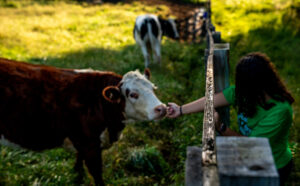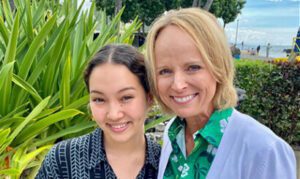My very first 4‑H demonstration was entitled “Omelet Up!”. When I started putting the demonstration together, I didn’t even know how to make one myself. Needless to say, a few YouTube videos later and a lot of practice, I became a star omelet maker.
As my demonstration advanced through San Joaquin County, North Central Section, and finally on to the California State level, I would beef up my speech with chicken and egg facts. I would tell the audience that a chicken lays an egg about every 26 hours. You can determine the color of the egg a chicken will lay by looking at the color of the earlobe. If you raise your own laying hens you might notice a spec of blood inside the egg. This defect is called a blood spot, and although it does not look appealing to the eye, it is safe to consume.
I like to start my omelet with two eggs and a splash of milk or half and half. It is important to season with salt and pepper. I melt a tablespoon of butter in a nonstick pan over medium-high heat. Then, I pour in the whisked egg mixture.
The most important part of the process is how you cook the egg. You don’t want the pan to be too hot and brown the egg. We are looking for a gentle heat. Use the idea “dig a hole and fill it”, moving the cooked egg from the outer edges into the center, allowing the remaining liquid egg to fill the holes you’ve just made.
The filling can be anything that tickles your fancy. I like cheese and bacon crumbles. Just make sure that your ingredients (bacon, sausage, peppers, onion, etc.) are pre-cooked and warm. As soon as you put in the filling, your omelet is done cooking so the ingredients won’t have time to heat up.
Fillings can be completely vegetarian or a meat lover’s dream. Any leftovers? Omelets are a great way to repurpose leftover meat and vegetables.
- 2 large eggs
- 2 tablespoons milk or half & half
- salt and pepper to taste
- 1 tablespoon butter
- 1/4 cup filling of your choice (I like sausage, grated cheese, sautéed bell pepper)
Cooking Instructions:
- In a small bowl, whisk together eggs, milk, salt and pepper. Set aside.
- Heat a medium nonstick skillet over medium-low heat. Add the butter allowing it to melt and coat the sides and bottom of the pan.
- When hot, pour in eggs. Using a rubber spatula, dig a hole and fill it.
- Bring the cooked egg from the edges to the center of the pan, allowing the liquid egg to fill the hole you just made.
- Once the egg is cooked place your filling on half. Flip the half of the egg without filling over the half with the filling.
- Gently slide out of the pan.





















